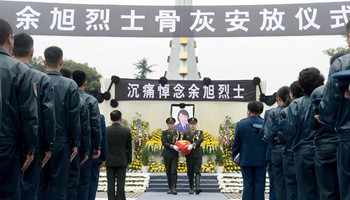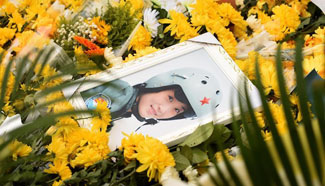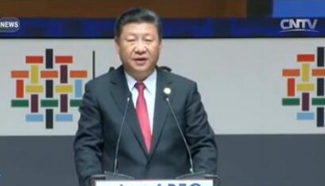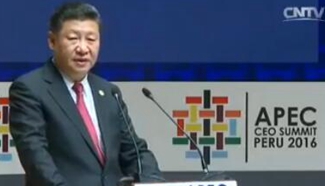BEIJING, Nov. 17 (Xinhua) -- "The toilet is the only thing that every time you see it, you pull down your pants. You don't do that with your wife."
Jack "Mr. Toilet" Sim, the founder and director of the WTO, is proud of his moniker and banter. Mr. Toilet's WTO, however, is not the World Trade Organization but the World Toilet Organization.
For 15 years, Singaporean Sim, 49, from the helm of the non-profit organization he established, has spearheaded a toilet revolution to improve toilets and sanitation conditions worldwide.
Sim chose to name Nov. 19 World Toilet Day, and in 2013 the day was sanctioned by the United Nations (UN).
The theme of this year's World Toilet Day -- Toilets and Jobs -- aims to promote better toilet facilities at offices, factories and construction sites.
British band Coldplay will play at the first-ever Global Citizen Festival in Mumbai, India, to celebrate the day, according to Sim.
CUT THE CRAP
"We use toilets every day, but we never talk about them," Sim said, warning that the consequence of such a silence can be fatal.
According to data from UN and World Health Organization, out of a global population of 7 billion, 2.4 billion people live without adequate sanitation. One in ten people has to defecate in the open.
Poor sanitation increases the risk of disease and malnutrition. Diarrhoea caused by poor sanitation and unsafe water kills 315,000 children every year. These deaths are preventable.
"One fly in the toilet is deadlier than 100 tigers. Toilets are the cheapest type of health care," Sim told Xinhua.
Every U.S. dollar spent on water and sanitation generates a return of 4.3 dollars in the form of reduced health care costs, according to WTO.
CALL OF NATURE
Sim was born and raised in a slum in Singapore. His family shared one toilet with nine other households. To call the facility a "toilet," however, would be a gross over exaggeration, as it was just a bucket with two boards, on top of which people squatted.
The toilet was always full of human waste, dirty toilet paper and sanitary pads, the smell hung heavy in the thick tropical air and there were always swarms of flies, Sim recalled.
From these humble beginnings, Sim rose high, and became a successful entrepreneur -- starting 16 companies by the age of 40.
Despite his success, he was not satisfied. He felt there was more that he could do -- to really make a difference. Sanitation, he found, was often neglected and the topic was a taboo shrouded in embarrassment. He decided to answer the call of nature.
Leaving his business, in 1998, Sim established the Restroom Association in Singapore. Three years later, he founded his WTO with 15 original member countries and held the first World Toilet Summit in Singapore.
WTO aims to break the taboo around toilets and the sanitation crisis. Since establishment, it has lobbied governments, public and private sector stakeholders and the international community to prioritize sanitation in the development agenda, according to Sim.
To break the taboo surrounding toilets, the former salesman realized humor is the best weapon.
Sim featured in a promotion poster and dressed up in a James Bond costume, and the title was an inverted 007 -- "LOO." In another poster, he was a genie in a chamber pot instead of a magical lamp.
"I'm going to turn 'poop culture' into pop culture," he said.
And he did it.
It is estimated that between 1990 and 2015, the use of improved sanitation facilities rose from 54 percent to 68 percent globally, according to data from the WHO and the UN Children's Fund (UNICEF).
UN has included the target to ensure everyone everywhere has access to toilets by 2030 in the Sustainable Development Goals launched in 2015.
THE CHINA STORY
Sim's toilet revolution in China revolutionized the country's tourist industry. In 2004, Beijing held the fourth World Toilet Summit, the first time in China.
The 2008 Summer Olympic Games host was determined to improved the infamous image of its stinking public toilets to prepare for the sporting event. Over 4,000 public toilets near the Tian'anmen Square and in the Hutong area were reconstructed.
"Better toilets also helped secure the success of the Beijing Olympic Games," said Sim.
Moreover, Sim believes, toilets could be a remedy for China's slowing economy.
"When you have better toilets, you have more tourists," he said. "China's GDP growth is 6.7 percent now. But if you have a vibrate tourist market, maybe you can post 7 or 8 percent growth."
"So toilets actually generate money. It is not just an expenditure," he added.
Following Beijing, toilet summits have also been hosted by Shanghai, Hainan, Taipei and Macao. About 25,000 public toilets in scenic areas in the country will be transformed by the end of this year, according to tourism authorities.
Sim also launched the Rainbow Toilet Program to in rural China. By improving sanitation conditions and promoting better hygiene in rural schools, the WTO aims to transform the lives of school children in central province of Hubei.
Comparing his opinion of China now with that in 1986 when he came for the first time, Sim said he can see the tremendous changes since the reform and opening up. However, sanitation in some underdeveloped areas in western China is still very poor.
"I hope the next toilet summit in China will be hosted by a western city to improve sanitation there," he said.










